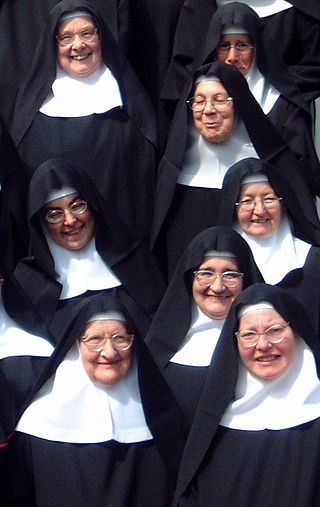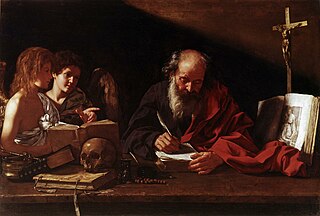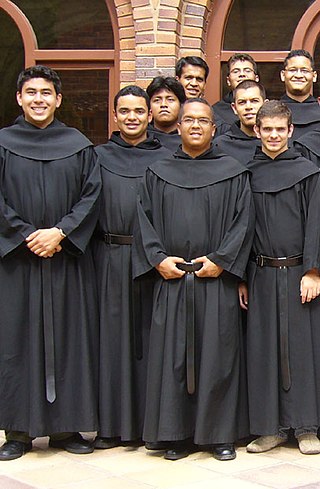Related Research Articles
Anglicanism is a Western Christian tradition which developed from the practices, liturgy, and identity of the Church of England following the English Reformation, in the context of the Protestant Reformation in Europe. It is one of the largest branches of Christianity, with around 110 million adherents worldwide as of 2001.

The Order of Preachers, commonly known as the Dominican Order, is a Catholic mendicant order of pontifical right that was founded in France by a Castilian priest named Dominic de Guzmán. It was approved by Pope Honorius III via the papal bull Religiosam vitam on 22 December 1216. Members of the order, who are referred to as Dominicans, generally display the letters OP after their names, standing for Ordinis Praedicatorum, meaning 'of the Order of Preachers'. Membership in the order includes friars, nuns, active sisters, and lay or secular Dominicans. More recently, there has been a growing number of associates of the religious sisters who are unrelated to the tertiaries.

A nun is a woman who vows to dedicate her life to religious service and contemplation, typically living under vows of poverty, chastity, and obedience in the enclosure of a monastery or convent. The term is often used interchangeably with religious sisters who do take simple vows but live an active vocation of prayer and charitable work.
A religious order is a lineage of communities and organizations of people who live in some way set apart from society in accordance with their specific religious devotion, usually characterized by the principles of its founder's religious practice. It is usually composed of laypeople and, in some orders, clergy. Such orders exist in many of the world's religions.

A hermit, also known as an eremite or solitary, is a person who lives in seclusion. Eremitism plays a role in a variety of religions.

A friar is a member of one of the mendicant orders in the Roman Catholic Church. There are also friars outside of the Roman Catholic Church, such as within the Anglican Communion. The term, first used in the 12th or 13th century, distinguishes the mendicants' itinerant apostolic character, exercised broadly under the jurisdiction of a superior general, from the older monastic orders' allegiance to a single monastery formalized by their vow of stability. A friar may be in holy orders or be a non-ordained brother. The most significant orders of friars are the Dominicans, Franciscans, Augustinians, and Carmelites.

Saint Dominic,, also known as Dominic de Guzmán, was a Castilian Catholic priest and the founder of the Dominican Order. He is the patron saint of astronomers and natural scientists, and he and his order are traditionally credited with spreading and popularizing the rosary. He is alternatively called Dominic of Osma, Dominic of Caleruega, and Domingo Félix de Guzmán.
The Society of the Atonement, also known as the Friars and Sisters of the Atonement or Graymoor Friars and Sisters, is a Franciscan religious congregation in the Catholic Church. The friars and sisters were founded in 1898 by Paul Wattson and Lurana White as a religious community in the Episcopal Church. The religious order is dedicated to the Blessed Virgin Mary under the Marian title of Our Lady of Atonement.

The term third order signifies, in general, lay members of Christian religious orders, who do not necessarily live in a religious community such as a monastery or a nunnery, and yet can claim to wear the religious habit and participate in the good works of a great order. Roman Catholicism, Lutheranism and Anglicanism all recognize third orders.
A religious is, in the terminology of many Western Christian denominations, such as the Catholic Church, Lutheran Churches, and Anglican Communion, what in common language one would call a "monk" or "nun".
The Dominican Sisters of the Heart of Jesus are located in Lockport, Louisiana. This group is not in any way associated with, approved, or recognized by the Diocese of Houma-Thibodaux, nor is it listed in the diocesan Directory, as per Fr. P. J. Madden, Diocesan Administrator.

Anglican religious orders are communities of men or women in the Anglican Communion who live under a common rule of life. The members of religious orders take vows which often include the traditional monastic vows of poverty, chastity and obedience, or the ancient vow of stability, or sometimes a modern interpretation of some or all of these vows. Members may be laity or clergy, but most commonly include a mixture of both. They lead a common life of work and prayer, sometimes on a single site, sometimes spread over multiple locations. Though many Anglicans are members of religious orders recognized by the Anglican Communion, others may be members of ecumenical Protestant or Old Catholic religious orders while maintaining their Anglican identity and parochial membership in Anglican churches.
The Brotherhood of Saint Gregory is a community of friars within the Anglican Communion. The community's members, known as Gregorians, include clergy and laymen. Since 1987 there has also been a parallel order of sisters, the Sisters of Saint Gregory.
Catholic spirituality includes the various ways in which Catholics live out their Baptismal promise through prayer and action. The primary prayer of all Catholics is the Eucharistic liturgy in which they celebrate and share their faith together, in accord with Jesus' instruction: "Do this in memory of me." The Catholic bishops at the Second Vatican Council decreed that "devotions should be so drawn up that they harmonize with the liturgical seasons, accord with the sacred liturgy, are in some fashion derived from it, and lead the people to it, since, in fact, the liturgy by its very nature far surpasses any of them." In accord with this, many additional forms of prayer have developed over the centuries as means of animating one's personal Christian life, at times in gatherings with others. Each of the religious orders and congregations of the Catholic church, as well as lay groupings, has specifics to its own spirituality – its way of approaching God in prayer to foster its way of living out the Gospel.

The Third Order of Saint Dominic, also referred to as the Lay Fraternities of Saint Dominic or Lay Dominicans since 1972, is a Catholic third order which is part of the Dominican Order.

Emerging since the 19th century, there are several Protestant adherent and groups, sometimes organised as religious orders, which strive to adhere to the teachings and spiritual disciplines of Saint Francis of Assisi.
A religious brother is a member of a religious institute or religious order who commits himself to following Christ in consecrated life of the Church, usually by the vows of poverty, chastity and obedience. He is usually a layman and usually lives in a religious community and works in a ministry appropriate to his capabilities.
When referring to Roman Catholic religious orders, the term Second Order refers to those communities of contemplative cloistered nuns which are a part of the religious orders that developed in the Middle Ages.
The following outline is provided as an overview of and topical guide to the Catholic Church:
The Order of Christ the Saviour (OCS) is an Anglo-Catholic dispersed Dominican community within the Episcopal Church and Anglican Communion. The Order is characterized by its study of Thomistic scholarship and its ministerial focus on deliverance ministry within the Anglican tradition. The Order adopts the Rule of St. Augustine, guiding its members towards a life of prayer, community service, and frequent engagement with the sacraments. Membership in the Order is open to confirmed communicants in good standing in communion with the See of Canterbury.
References
- ↑ Goodrich, Kevin (2009). Anglican Dominicans: An Introduction for Seekers and the Curious. Createspace Independent Pub. ISBN 978-1-4975-9565-1.
